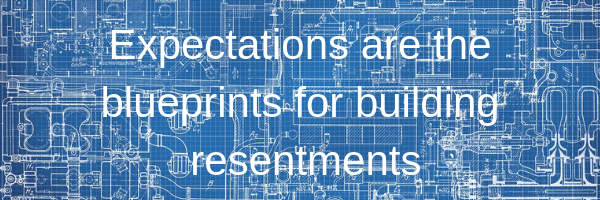
When I think about the times in my life that I have felt the most hurt, disappointed or frustrated, they all have to do with unmet expectations. Someone did not do, say or behave in the way I anticipated ~ and they should have. I mean, it seemed like a reasonable assumption. Doesn’t everybody expect that?
Apparently not.
The thing about expectations is that they’re a one way street. They are something we hold about someone or something, usually without their awareness because expectations are also largely unspoken. Especially the ones that are so deeply embedded in our psyches and personalities that we believe they are universal to everyone.
But they’re not.
And then when others don’t meet our expectations we are hurt, disappointed, frustrated or all of the above. Herein lies the building blocks of resentment.
Most of our hurts and disappointments are small so we don’t deal with them at the time:
- I thought you would call me on my birthday (I always call you)
- I expected you to take care of the car maintenance (my dad always did)
- I assumed you would check with me before spending that much (wouldn’t anyone?)
Over time, the pattern of unmet expectations sours into a belief that others are the source of your pain and resentment results. As resentments build, relationships are damaged.
The good news is that as the “holder of expectations,” you have the power to change the dynamic. You can choose to let go of your expectations.
But wait a minute!, you say; don’t I have a right to some expectations in my relationships?
Don’t confuse expectations with agreements.
Expectations are what we hold over another without an agreement. An agreement represents shared expectations that flow both ways.
Agreements require communicating your expectations and understanding the expectations of others, with the opportunity to create commitments that honor both of you. An agreement also offers accountability. It is different to confront someone when they have not kept their agreement with you, then when they’ve not met your expectations.
Agreements are about your relationship; expectations are about you. Which one you choose to focus on makes all the difference.






